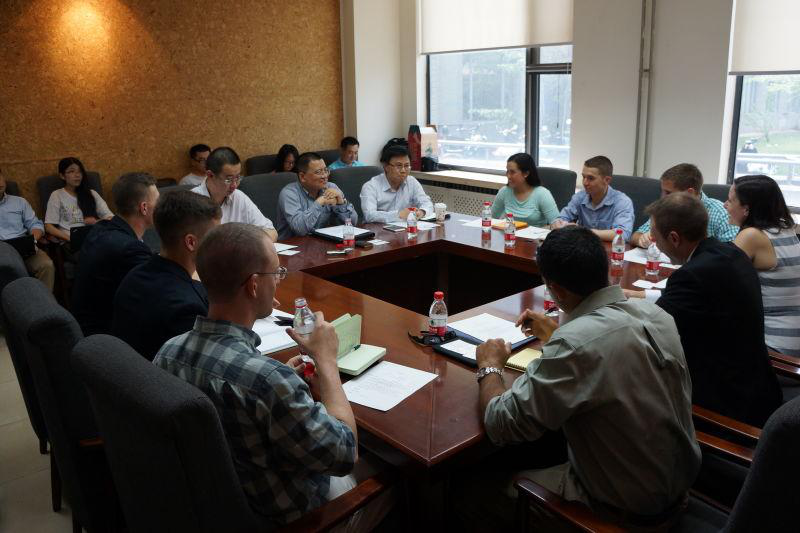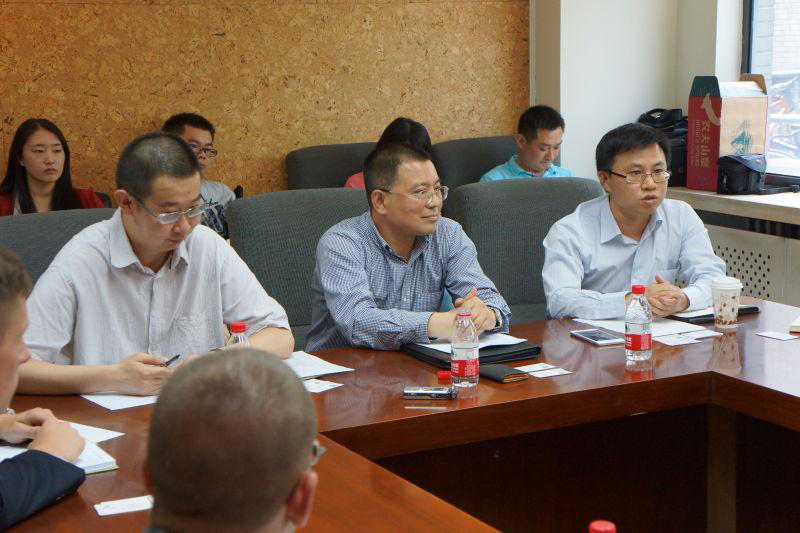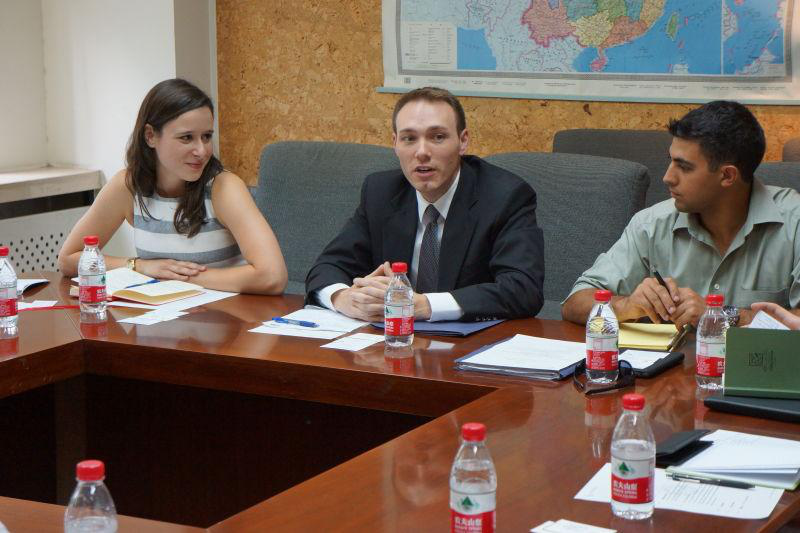On the afternoon of June 17, 2015, a delegation from the United States Military Academy visited the School of International Studies and held a symposium on China-U.S. relations with teachers and students. The symposium was jointly hosted by theInstitute for Global Cooperation and Understanding, Peking University (iGCU) and the American Studies Center, Peking University at Conference Room C104 of the School of International Studies. The symposium was presided over by Wang Dong, Executive Deputy Director of theInstitute for Global Cooperation and Understandingand Associate Professor of the School of International Studies. Associate Professor Yu Tiejun, Deputy Dean of Institute of International and Strategic Studies of Peking University, Dr. Li Chen from the School of International Studies, Renmin University of China, and Dr. Wu Xiangning from School of International Studies, Peking University, attended the symposium. Postgraduates from the School of International Studies, Peking University participated in the discussion.

At the beginning of the symposium, Associate Professor Wang Dong extended a warm welcome to the teachers and students from the United States Military Academy. Then, the teachers and students introduced themselves one by one. Associate Professor Erica Borghard from the United States Military Academy introduced the Grand Strategy Program and stressed that the Program aims to develop students' strategic thinking and lay a solid foundation for future engagement in the U.S. defense.

Associate Professor Wang Dong first made comments on the Mil-to-Mil Relations between China and U.S. He pointed out that the two countries' are seeing more military cooperation though it is the weakest link in China-U.S. relations. Cooperation between China and the U.S. in anti-terrorism actions and joint military drills generated a positive impact on the bilateral relationship. The ever-strengthening military exchanges and execution of military agreements between China and the U.S. are results of rational decision making by both countries' leaders. At the same time, Associate Professor Wang Dong also stressed the importance of people-to-people exchanges, especially exchanges among students in both countries. He pointed out that the "silent majority" is actually practitioners of the new type of great power relationship between China and the U.S. Associate Professor Wang Dong extended his wish that the present students of the United States Military Academy could make contributions to the promotion of China-U.S. relations when they become major military and political officials. Associate Professor Yu Tiejun shared his opinion on the possible impacts of East Asia security on China-U.S. relations.He indicated that there have been many discussions in the academic circles about the tipping point of China-U.S. relations. China and the U.S. have begun to wrestle in four strategic areas: marine safety, network, outer space and nuclear weapons. But the relationship between the China-U.S. relations and the security situations in East Asia is getting more attention from the international community. Using North Korea nuclear issue as an example, he pointed out that China and the U.S. did not show much cooperative capability despite they share many strategic interests and concerns. Later on, he commented on China-Japan strategic relations and said that this relationship is still very fragile though the tension has been eased since last year. This year, the Guidelines for US-Japan Defense Cooperation is amended for the third time, and the majority of the amendments are targeted at China. With the increasingly close U.S.-Japan relations and the complex bilateral relations of China and Japan, the U.S. will fall into a deadlock if China-Japan crisis was to escalate. Hence, he believes that the US intervention will not bring any positive impacts to China-Japan conflicts. Recently, the South China Sea dispute has become a hot issue in China-U.S. relations, and puts forward a test for China and America' s ability to solve regional conflict. Dr. Li Chen talked about the gap in military technologies between China and the U.S. According to Dr. Li, the gap in military technologies between China and the U.S. since the 1990s was partly rooted in the multiple reforms in tactics and trainings, as well as advanced technologies adopted by the U.S. army, which got stimulated from its experience in the Vietnam War. On the other hand, China' s conventional force remained backward in the middle and later periods of the Cold War. By the end of the Cold War, the U.S. army has marched into the information age, while Chinese army haven' t realized mechanization. The military forces of the two countries had a gap of era. China deeply recognized this gap after first Gulf War, the Taiwan Strait crisis in 1996 and other similar events. With China' s stronger economic and technological strengths and accelerated military modernization after stimulated by the gap of era, as well as the U.S.' s slowed construction of conventional forces resulted from its post-cold war "peace dividend" ideology and its 13-year long occupation in the anti-terrorism and anti-rebellion operations in Iraq and Afghanistan, this gap of era gradually disappeared after 2010. However, there still remains a gap of generation. Besides, the U.S. army possesses unique advantages in terms of command and control system, operational experience, education and training system, as well as backup of the alliance system. Dr. Li Chen also pointed out that the discussions on concepts such as "Air-Sea Battle" confused the problems in the operational level and the strategic level. In the operational level, it is understandable to make plans based on the worst case scenario, but the strategic level must emphasize on stability. It is dangerous to guide discussions in the strategic level with issues on the operational level.

Then, the seminar entered the session of open-ended discussion. Associate Professor Borghard from the United States Military Academy and another lead teacher Shawn Lonergan, an Instructor in the School of Social Sciences responded to the professors above. They pointed out that the cold war mentality is inapplicable to China-U.S. relations given the increasing interdependency between the two countries. Therefore, it is very important to establish aninstitutionalizedcrisis management mechanism. It can reduce the possibility of security dilemma and create a buffer zone for China-U.S. relations. Participating teachers, students from the United States Military Academy and School of International Studies also engaged in heated discussions about the rising China, new cold war mentality, cultivation mechanism of military officers in China and America' s Asia-Pacific rebalancing strategy.
At last, Associate Professor Wang Dong summarized and concluded the seminar. He indicated that the U.S. should promote its understanding of China to reduce misinterpretation and misunderstanding. He is optimistic about China-U.S. relations and believes that it is very important to increase collaboration of all aspects, including the cooperation between Institute for Global Cooperation and Understanding of Peking Universityandthe United States Military Academy. He extended his welcome to teachers and students of the United States Military Academy to visit Peking University again, and wished that both parties could contribute to the promotion of China-U.S. relations.
